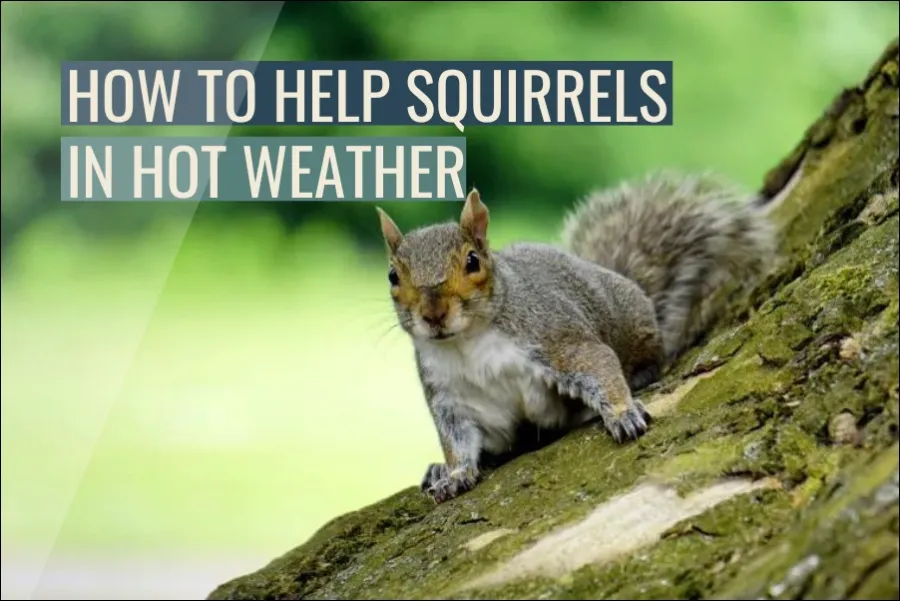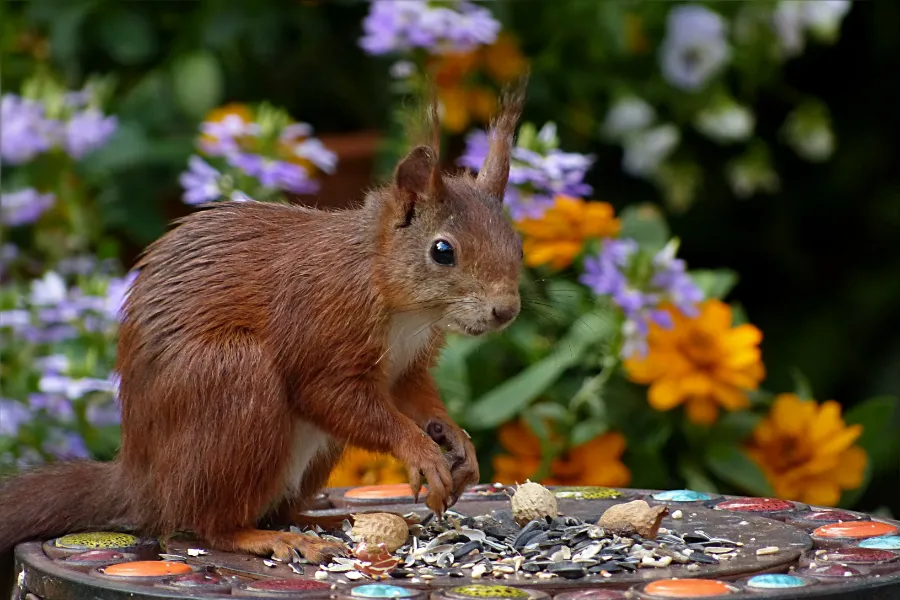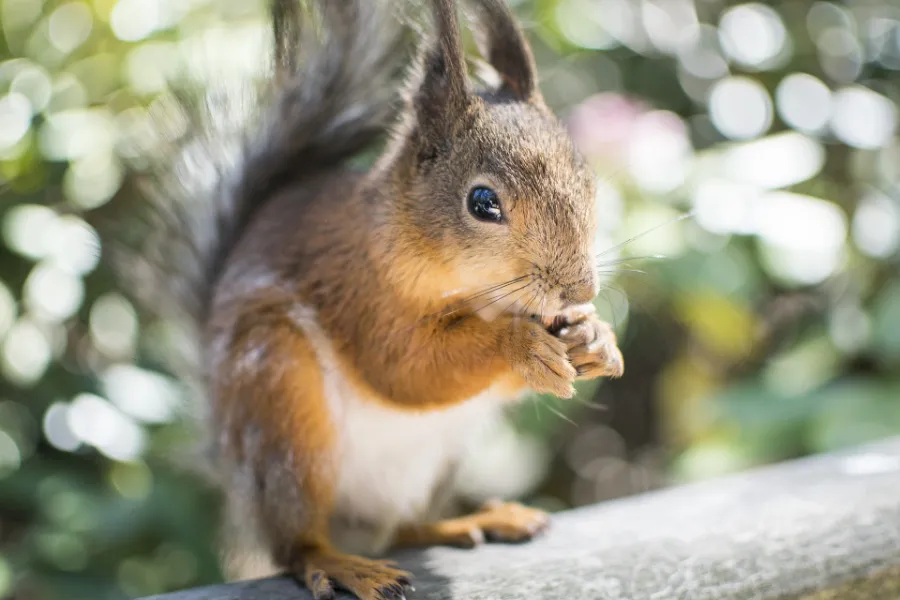
Summer can be a challenging time for squirrels, as high temperatures and lack of water can put these animals at risk. Fortunately, there are many ways you can help squirrels cope with the heat and stay healthy during the hot weather.
Help squirrels in hot weather by providing extra food and water, creating a cool, shaded environment, protect from dehydration and heat stroke, and taking care of injured squirrels. Also, protect from predators and harmful substances, plant native plants, and educate others.
From providing additional food and water to creating a cool, shaded environment, there are many steps you can take to support these animals and ensure their well-being.
Providing extra food and water
To be healthy, squirrels require a continuous supply of food and water, which is especially critical during hot weather when these resources might be sparse. You may provide squirrels with a range of foods, such as nuts, seeds, and fruits, to help them acquire the nutrition they require. These creatures are particularly fond of peanuts, sunflower seeds, and walnuts. A clean, conveniently available water source, like as a birdbath or a water bottle with a built-in sipper tube, is also a good option. To keep the water from becoming unclean or stagnant, replenish or change it on a regular basis.
Creating a cool, shaded environment
Squirrels are heat sensitive and can suffer from heat stress if exposed to lengthy periods of heat and sun. It is critical to give lots of shade and cover for these animals in order for them to keep cool. This can be accomplished by planting dense foliage trees or shrubs, or by providing squirrels with shaded cover, such as a nest box or an insulated home. It’s also a good idea to keep windows and doors shut to keep squirrels out of your home, where they might become trapped or overheated.
Protecting squirrels from dehydration
During hot weather, squirrels are vulnerable to dehydration because they rely on water to regulate their body temperature and remove toxins from their bodies. It is critical to provide squirrels with clean water at all times to help avoid dehydration. This can be accomplished by providing a water supply, as indicated above, or by strategically distributing water dishes throughout your yard. It’s also a good idea to avoid using pesticides or other chemicals that might pollute water supplies, as they can affect squirrels and other animals.

Protecting squirrels from heat stroke
Heat stroke is a dangerous ailment that can occur when an animal is repeatedly exposed to extreme temperatures. Heat stroke symptoms in squirrels include panting, drowsiness, and lack of appetite. It’s critical to give lots of shade and shelter for squirrels to avoid heat stroke. This can be accomplished by planting dense foliage trees or shrubs, or by providing squirrels with shaded cover, such as a nest box or an insulated home. It’s also a good idea to keep windows and doors shut to keep squirrels out of your home, where they might become trapped or overheated. If you come across a squirrel that looks to be suffering from heat stroke, you must act quickly to cool the animal down. This can be accomplished by soaking a towel in cool water and laying it on the squirrel’s head and neck, or by misting the animal with cool water. It’s also a good idea to move the squirrel to a cool, shady spot and provide it some water to drink if it can.
Helping injured or orphaned squirrels
If you come across an injured or orphaned squirrel, it is critical that you handle the animal with care and get proper aid. Because injured squirrels may be in shock, it is critical to treat them carefully and keep them calm. If the squirrel is not seriously damaged, attempt to confine it in a cardboard box or pet carrier and take it to a wildlife rehabilitation clinic. If the squirrel is critically damaged or looks to be orphaned, it is critical to get help from a professional wildlife rehabilitator or your local animal control department. In the meanwhile, you may provide interim care for the squirrel by giving a cool, shady spot to relax and a small quantity of food and water if it is able to eat and drink.
Protecting squirrels from predators
Squirrels may be at greater risk of predation during hot weather, as predators may be more active and hungry. To protect these animals, it’s important to keep your own pets under control and to supervise them when they are outside. You can also provide squirrels with shelters and hiding places where they can escape from predators, such as nest boxes or insulated houses. In addition, removing or trimming dense vegetation and using fencing or netting can help block predators from entering areas where squirrels are present.
Protecting squirrels from harmful substances
Keeping squirrels away from dangerous chemicals that might cause disease or injury is critical during hot weather. Pesticides, chemicals, and rubbish are examples of things that can be hazardous to these creatures. To keep squirrels safe from these chemicals, store them securely and keep them away from locations where squirrels may be present. It’s also a good idea to properly dispose of rubbish, as unsecured waste attracts squirrels and other wildlife and may contain toxic substances. Furthermore, it is critical to avoid spraying pesticides or other chemicals near squirrel habitats since these compounds may be detrimental to both the animals and the environment. You may help safeguard squirrels from danger and preserve their well-being by adopting these steps.

Planting native plants
Planting native plants may give a variety of benefits to squirrels and other animals, such as food, shelter, and shade. Native plants have evolved to the local temperature and soil conditions, making them more resistant to pests and diseases and better able to handle harsh weather. Oak trees, pine trees, and shrubs like sumac, elderberry, and blackberry are all fantastic natural plant alternatives to consider for a squirrel-friendly landscape.
Avoiding the use of pesticides and other harmful chemicals
Pesticides and other hazardous substances may be poisonous to squirrels and other animals, as well as pollute water and soil. It is critical to avoid using these compounds wherever feasible in order to safeguard these species and the ecosystem. Instead, try employing natural pest management methods like as predators or traps. If pesticides must be used, make sure to carefully follow the label directions and keep these compounds away from locations where squirrels and other animals may be present.
Educating others about how to help squirrels
Education about how to aid squirrels and other wildlife is one of the most effective methods to help these animals. You can help raise awareness and motivate others to take action by sharing information about the significance of saving squirrels and their habitats. You may also urge others to undertake squirrel-friendly habits like growing native plants and limiting the use of toxic pesticides. We can have a good influence on squirrels and the environment if we all work together.
What is too hot for a squirrel?
Because squirrels are acclimated to a wide range of climates and can handle a wide range of temperatures, determining a single temperature at which it gets too hot for them is challenging. However, it is widely acknowledged that squirrels are heat sensitive and can suffer from heat stress if exposed to lengthy periods of heat and light. During hot weather, it is critical to provide squirrels with plenty of shade and cover to keep them cool and avoid heat stroke. If you come across a squirrel that looks to be suffering from heat stroke, intervene quickly to cool the animal down and get appropriate medical assistance. Heat stroke symptoms in squirrels include panting, drowsiness, and lack of appetite.
Comparison between helping squirrels in hot weather and in winter
Providing additional food and water, establishing a cool, shaded habitat, preventing against dehydration and heat stroke, and caring for wounded or orphaned squirrels are all part of helping squirrels in hot weather. It also entails safeguarding squirrels against predators and dangerous substances, growing native plants, minimizing the use of toxic chemicals, and teaching others on how to assist these creatures. Helping squirrels in the winter, on the other hand, entails providing extra food and water, creating a warm, dry place to shelter, protecting from predators, planting a squirrel-friendly winter garden, insulating water sources to prevent freezing, avoiding the use of harmful chemicals, and educating others on how to help these animals. In order to prepare for winter, it is critical to ensure that squirrels have the supplies they require to endure the colder months. By doing these steps, you may assist squirrels in preparing for and surviving the winter season.
In conclusion
In conclusion, there are several strategies to assist squirrels in staying healthy and coping with the summer heat. You may help these creatures by giving additional food and water, establishing a cool, shaded habitat, shielding squirrels from dehydration and heat stroke, and caring for wounded or orphaned squirrels. Furthermore, protecting squirrels from predators, humanely controlling rodent populations, planting native plants, avoiding the use of pesticides and other harmful chemicals, and educating others on how to help squirrels are all important steps you can take to help these animals and their communities.
